Choosing the right approach can significantly impact your business's ROI when hiring a new employee or working with a consulting firm.
The demand for consulting services is steadily increasing, with the global consulting market projected to reach US $1.3 trillion by 2026, according to a report by ResearchAndMarkets. This trend underscores the value consulting firms can provide to businesses seeking to maximize their ROI.
However, it is essential to weigh the benefits and drawbacks of hiring a full-time employee versus a consulting firm. This article will examine the key factors you must consider when making this critical decision for your business.
Pros and cons of hiring full-time employees
While hiring an in-house team has many benefits, retaining and motivating employees can have high recurring costs. Here's a further look at the pros and cons of hiring full-time workers.
The pros of hiring full-time employees
1. Increased control
When an employee is registered within an organization, the company has more control over their work and can more easily provide feedback, adjust goals, and hold them accountable for their deliverables.
2. Loyalty and commitment
Business leaders may need more control when working with consulting firms, as they don't work for the company directly. However, businesses can set clear expectations, hold consultants accountable, and leverage them for knowledge retention to build internal capabilities quickly. In addition, by connecting consultants with internal teams and documenting shared knowledge, businesses can maintain control and build upon the expertise gained from consulting firms.
3. Cultural fit
If perks help hire the right people, culture makes them stay.
Cultural fit refers to the alignment between the company's values, beliefs, and behaviors and those of the employee or consultant.
Hiring employees who fit well with your company's culture can have several benefits, such as increased engagement and job satisfaction, better collaboration and teamwork, reduced conflicts, and a stronger brand image.
Additionally, employees who embody the company's values and beliefs can become brand ambassadors, promoting the company's reputation and helping to attract customers and top talent.

The cons of hiring full-time employees
1. High costs and taxation
The time and money that go into hiring and sustaining full-time employees are sometimes too extravagant. In addition, as a registered company, the government taxation process also gets tedious with having more and more resources onboard.
2. Talent scarcity
We see businesses settling down for some mediocre talent because the requirement is urgent and good talent is hard to find esp., with the larger talent pool, and they have multiple options to choose their employer from.
Generating a brand's value proposition and finding people who add value to it takes more work, and those people are more challenging to retain.
3. Training and retention
In a constantly changing market where social media dictates trends and companies are looking for any way to go viral, it's essential to keep employees trained and informed on the latest tools, trends, and techniques to do their jobs well.
Upskilling programs like these, while beneficial, cost the employer additional time, resources, and money.
In a nutshell: Pros and cons of hiring full-time resources
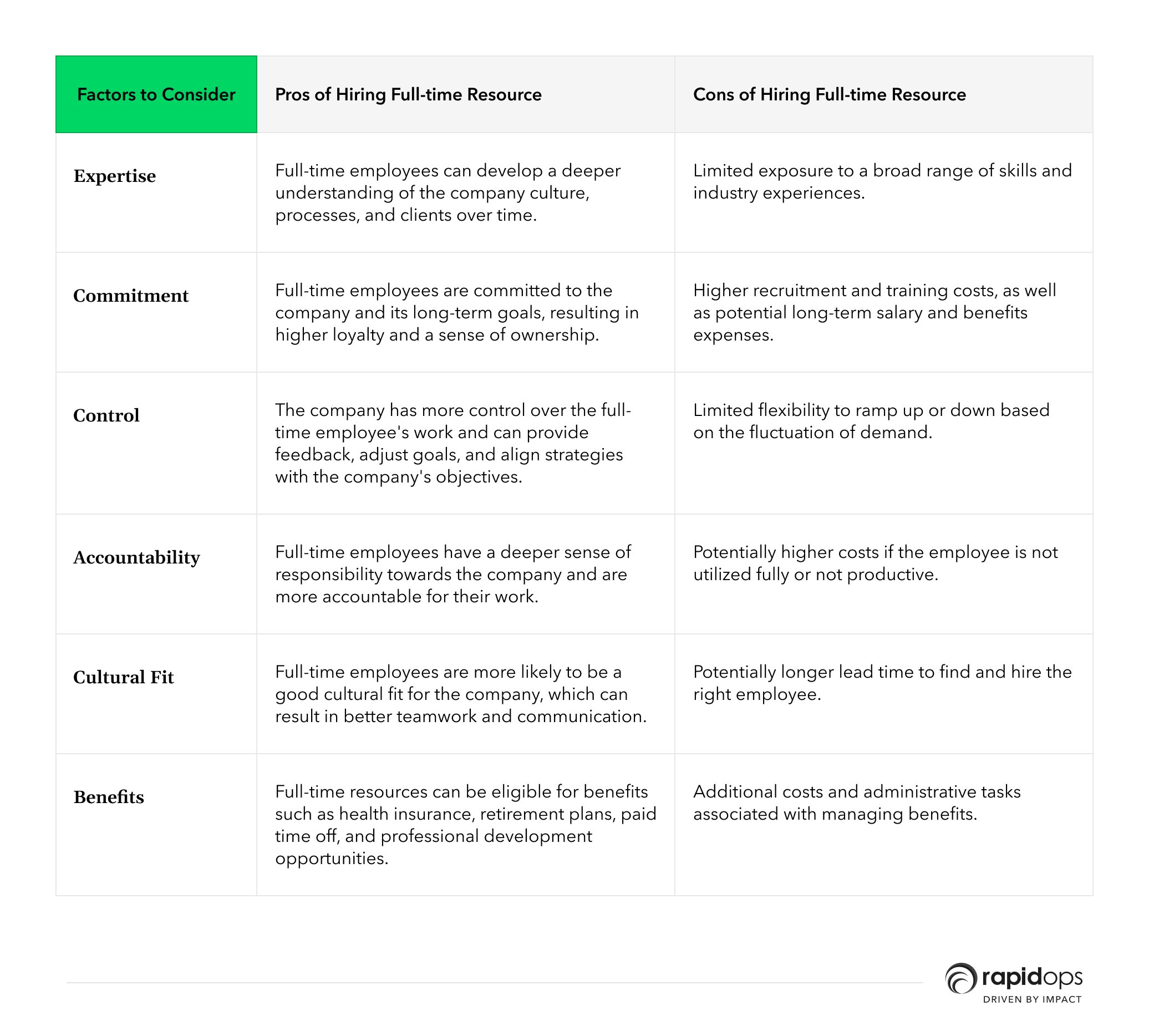
Pros and cons of hiring consulting firms
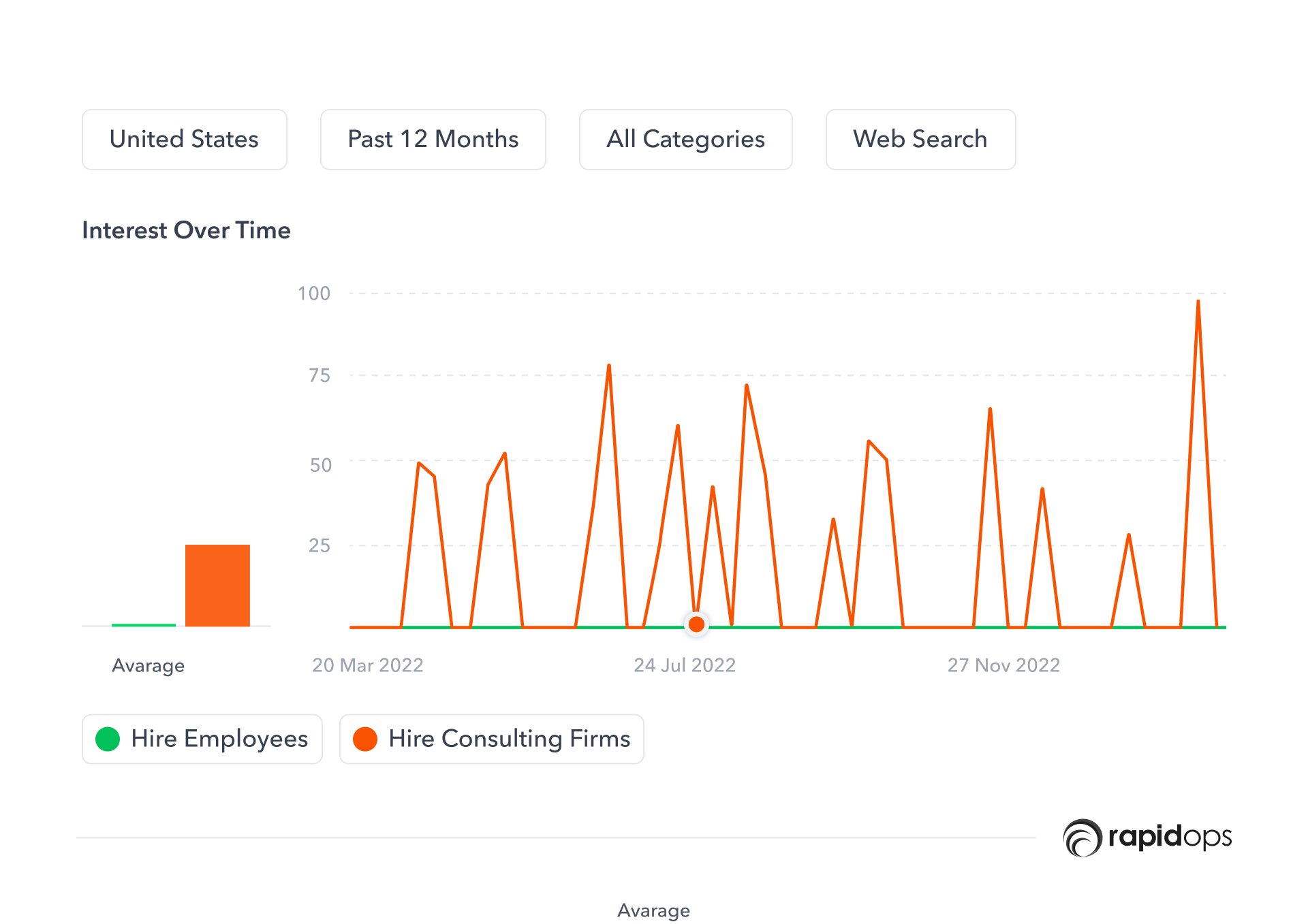
As we see in the graph above, presented by Google Trends, the search query' hire full-time employees' flatlined, and the term 'hire a consulting firm' spiked considerably.
While every organization is unique, it's essential to look at why there's been an increase and shift toward hiring consulting firms to meet business needs and weigh the benefits and drawbacks to see if they fit your business.
The pros of hiring a consulting firm
1. Scalability
One of the most significant benefits of hiring a consulting firm is scalability.
With experienced consultants in today's business landscape, consulting firms handle projects from start to finish, not just a piece of it, while increasing efficiencies and clearing up repetitive operational tasks.
2. Flexibility
Consulting firms can provide a range of services and expertise, allowing them to adapt quickly to your company's changing needs.
Consulting firms also provide a fresh perspective and new ideas to help your company innovate and stay ahead of the competition.
They bring a wealth of experience from working with different companies and industries and can provide valuable insights and best practices that can help improve your company's operations and performance.
3. Specialized skilled labor
When you hire a consulting firm with excellent credentials, you no longer have to worry about the headaches of hiring qualified talent.
Consulting firms have the best talent because their work should live up to the brand's credentials; hence, discovering, screening, and recruiting efficient staff is one of the best things they are known for.
Rapidops, a trusted consulting partner based in Charlotte, NC, specializes in building tailored solutions for businesses that may need more talent or resources to do so. From streamlining operations to gaining a competitive edge, Rapidops prides itself on reliving tangible client results while fostering positive, ongoing relationships.

The cons of hiring a consulting firm
1. Communication gap
If consultants are located in a different place from the company, they can face communication and coordination challenges. Still, they can also offer valuable perspectives, ideas, and solutions to problems that may not have been considered otherwise. The right consultants can help organizations grow faster and eliminate biases by pushing their thinking and working alongside their existing teams.
2. Lack of control
Business leaders may need more control when working with consulting firms, as they don't work for the company directly. However, businesses can set clear expectations, hold consultants accountable, and leverage them for knowledge retention to build internal capabilities quickly.
In addition, by connecting consultants with internal teams and documenting shared knowledge, businesses can maintain control and build upon the expertise gained from consulting firms.
3. Potentially higher cost
While consulting firms may be more expensive, finding the right partner that offers top-notch services at a reasonable cost is essential. Although the hourly rate may be high, the value received can be better, resulting in a lower overall price when launching a new project or initiative. It's essential to compare the total cost of hiring and retaining a full-time employee, including taxes and benefits, with the final consultant fees to make an informed decision.
At a glance: Pros and cons of hiring a consulting firm
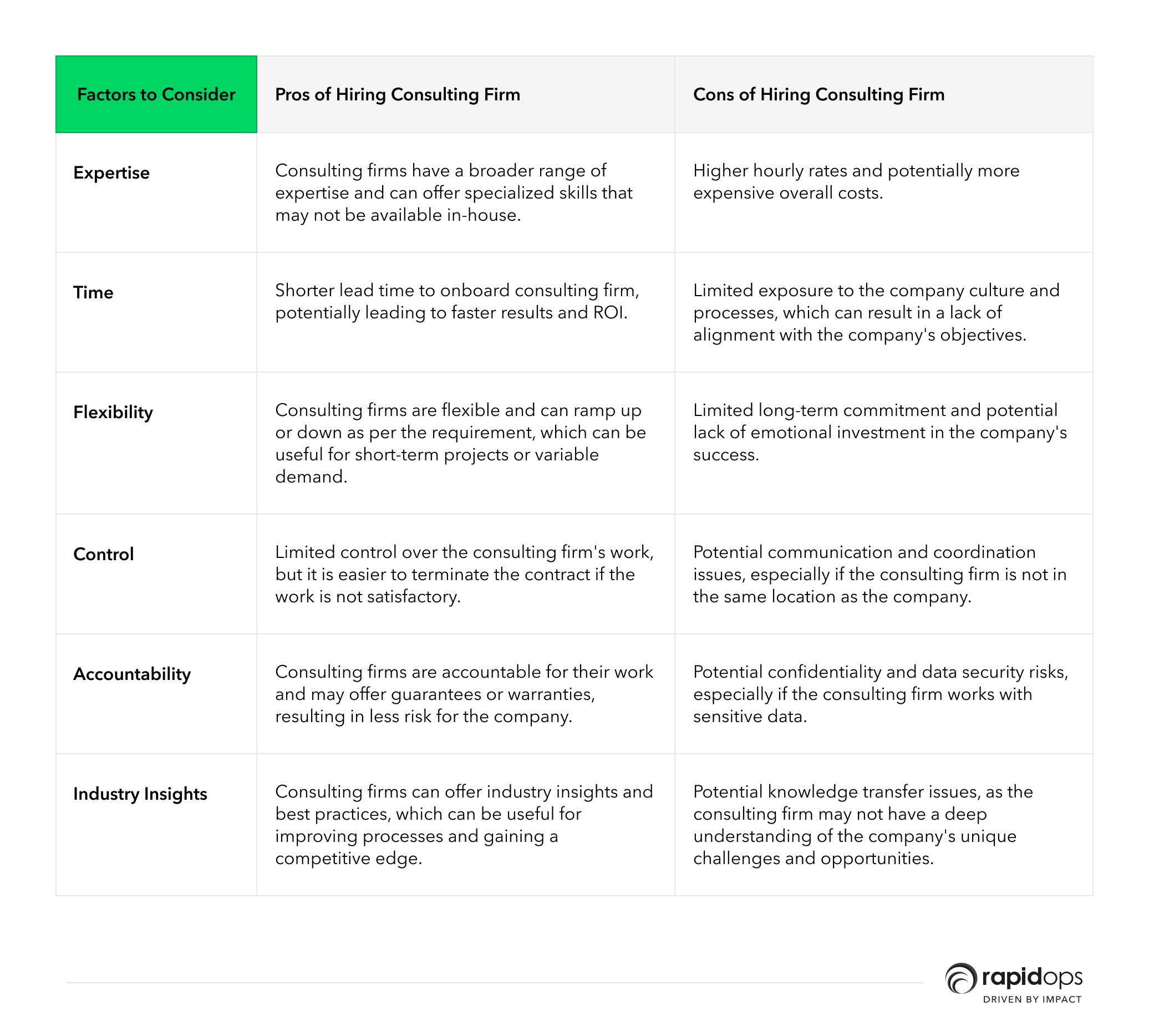
Maximizing benefits and mitigating drawbacks of IT consulting services
Rapidops provided valuable IT consulting services to Harris-Teeter, offering tailored solutions that enabled effective communication and regular updates. Throughout the process, Rapidops emphasized collaboration and client input, ensuring that Harris-Teeter had a voice in decision-making and plenty of opportunities for feedback. As a result, Rapidops delivered flexible IT solutions that could adapt to changing project needs.
Drawbacks that we helped Harris-Teeter to overcome
Overall, Harris-Teeter successfully navigated the benefits and drawbacks of working with a consulting firm, thanks partly to Rapidops' deep understanding of the company's unique needs and challenges. Despite the potential disadvantages of working with an external team, Rapidops mitigated these concerns through its personalized approach and effective communication.
Factors to consider before hiring full-time employees vs. consulting firm
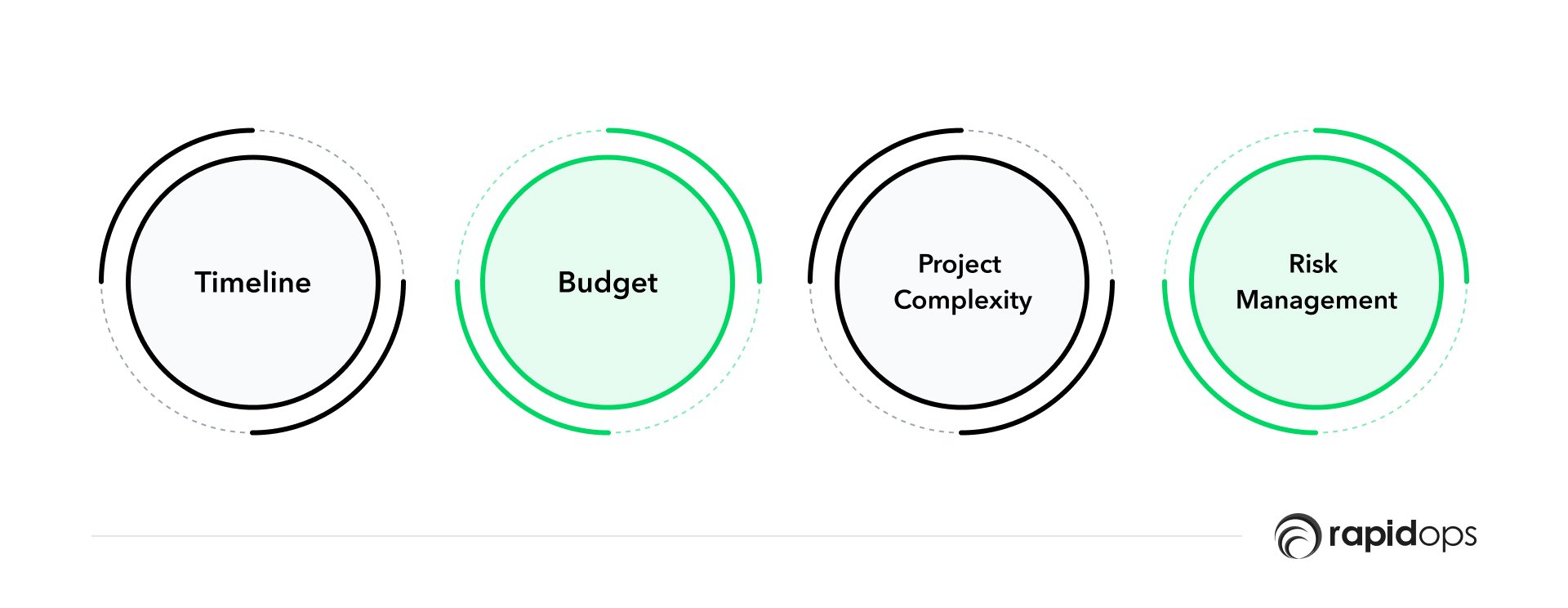
For any business putting in their time and money to hire talent in either resource form or through consulting, there will be a thin line between 'this might work' versus 'the other option could have worked out better.'
Here are the key factors to consider that will help you identify whether you need full-time resources or a consulting firm:
1. Timeline
Businesses should consider the project timeline when deciding whether to hire a full-time employee or partner with a consulting firm for technology-related projects.
Consulting firms may be more efficient for projects with tight deadlines or significant upfront work. Full-time hires may be more practical for long-term initiatives requiring ongoing support, but a consulting firm can still offer benefits such as growth opportunities and talent retention support.
2. Budget
Before deciding between hiring full-time resources and a consulting firm, it is essential to consider the cost-effectiveness of each option.
While full-time resources may seem more cost-effective in the short term, a consulting firm may offer a better value proposition in the long run.
For example, a consulting firm may have a larger pool of talent, and its expertise can help streamline processes and reduce costs over time.
3. Project complexity
The complexity of a project can also influence whether it's best to hire full-time resources or a consulting firm.
For instance, a project with many moving parts or technical requirements may benefit from the expertise and resources of a consulting firm with a diverse skill set.
Alternatively, hiring full-time resources may be more cost-effective if the project is relatively straightforward and doesn't require much specialized knowledge.
4. Risk management
Finally, it is crucial to consider the risks associated with hiring full-time resources versus a consulting firm. For example, full-time resources may be a greater risk for organizations uncertain about their long-term needs or facing financial challenges.
On the other hand, a consulting firm can help mitigate risk by providing a flexible, scalable solution tailored to the organization's specific needs.
The negative impact of a wrong decision on the business
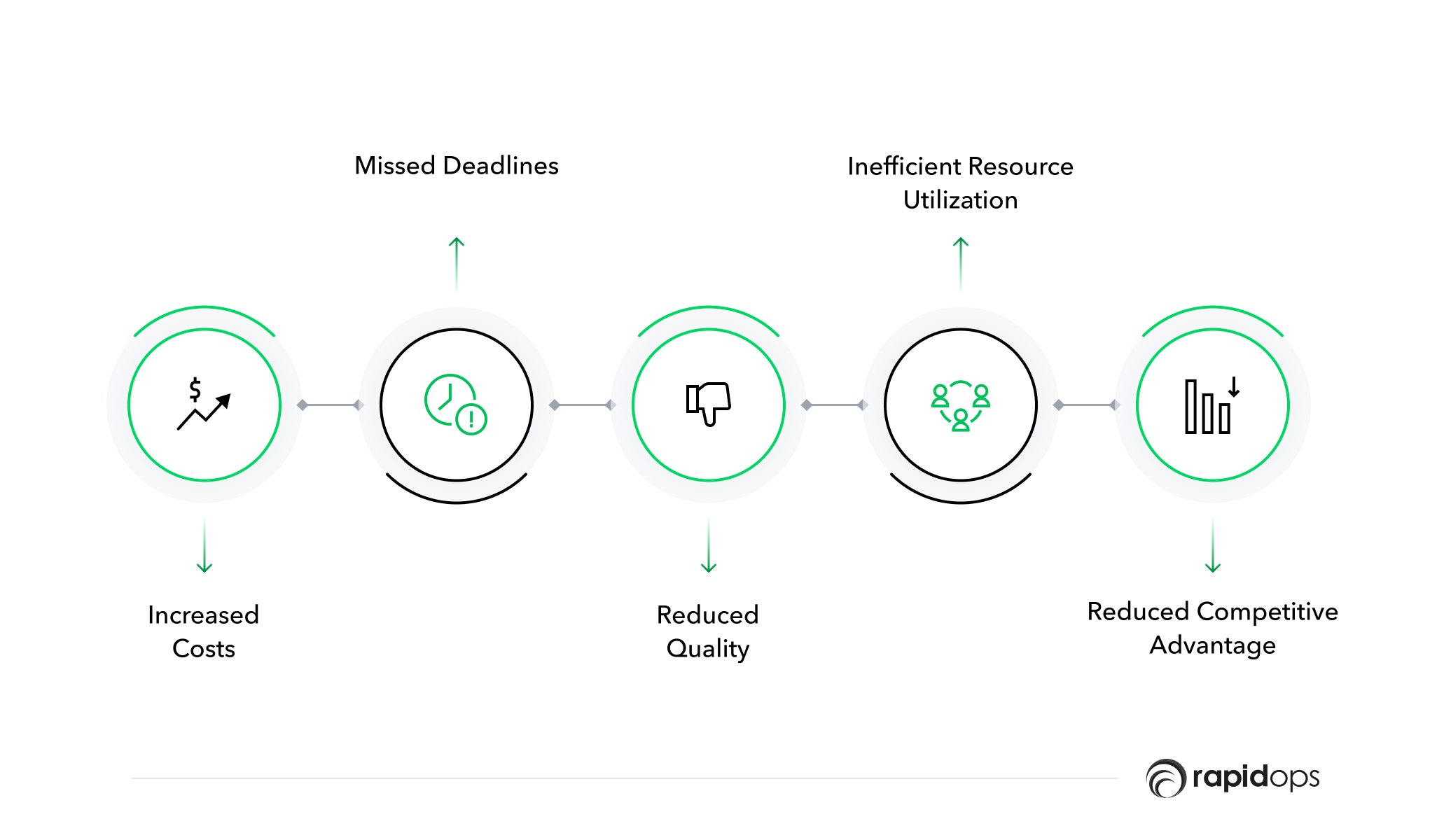
Businesses often need help identifying what they need, and until they start facing the implications, it's too late. Some of them can be as below:
1. Increased costs
More clarity around resource requirements can result in inefficiencies and increased costs.
For example, suppose a company hires full-time employees for a project that requires specialized expertise. In that case, they may spend more on salaries and benefits than they would have by hiring a consulting firm with the necessary skills.
2. Missed deadlines
A clear understanding of the project's requirements may allow a company to meet project deadlines. However, this could result in delays, missed opportunities, and dissatisfied customers.
3. Reduced quality
Hiring the wrong type of resources can also lead to a reduction in the quality of work produced.
For instance, if a company hires full-time employees for a project that requires a high level of expertise, but the employees need to possess the necessary skills, the end product may not meet the desired quality standards.
4. Inefficient resource utilization
A company may also face the challenge of resource underutilization or overutilization if they are still determining the right type and number of resources required for the project. This can lead to wasted resources or a lack of resources, resulting in project delays, decreased productivity, and increased costs.
5. Reduced competitive advantage
Finally, a company that cannot make informed decisions about resource allocation may need to catch up to its competitors.
Competitors who have effectively utilized consulting firms may have an advantage in cost savings, expertise, and flexibility.
Making the right decisions for your business is crucial, but it can be challenging without revealing sensitive information to competitors.
Avoid costly mistakes: Harness the power of expert consulting
Failing to identify your company's needs can lead to inefficiencies, increased costs, missed deadlines, and lower-quality work. These issues can hinder your company's growth and competitiveness.
To avoid these negative consequences, consider partnering with a consulting firm that can provide expertise, cost savings, and flexibility to make informed decisions about resource allocation.
By working with a trusted consulting partner like Rapidops, you can benefit from their deep understanding of businesses' unique needs and challenges and receive tailored solutions to help you avoid the negative impact of wrong decisions and achieve business growth.
Keep your competitors from getting ahead - prioritize your company's future success by making informed decisions. Contact Rapidops for a consultation and take the first step towards achieving your business goals.
Final words
In conclusion, deciding whether to hire full-time employees or consulting firms requires thoroughly assessing project requirements, constraints, and goals.
By carefully evaluating the factors discussed in this article, you can make informed decisions that ensure maximum return on investment (ROI) and long-term success.
Ultimately, balancing cost, expertise, and flexibility is the key to achieving maximum ROI.
While full-time resources may offer stability and institutional knowledge, consulting firms can provide specialized expertise, scalability, and cost-effectiveness.
Whether you hire full-time resources, consulting firms, or a combination of both, companies prioritizing resource allocation are more likely to achieve their goals and long-term success.

Niyati Madhvani
A flamboyant, hazel-eyed lady, Niyati loves learning new dynamics around marketing and sales. She specializes in building relationships with people through her conversational and writing skills. When she is not thinking about the next content campaign, you'll find her traveling and dwelling in books of any genre!
What’s Inside
- Pros and cons of hiring full-time employees
- In a nutshell: Pros and cons of hiring full-time resources
- Pros and cons of hiring consulting firms
- At a glance: Pros and cons of hiring a consulting firm
- Maximizing benefits and mitigating drawbacks of IT consulting services
- Factors to consider before hiring full-time employees vs. consulting firm
- The negative impact of a wrong decision on the business
- Final words

Let’s build the next big thing!
Share your ideas and vision with us to explore your digital opportunities
Similar Stories
- Strategy
- undefined Mins
- February 2017

- Strategy
- 19 Mins
- August 2023


Receive articles like this in your mailbox
Sign up to get weekly insights & inspiration in your inbox.

